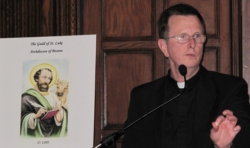Health care tradition, need for prayer stressed at guild event
BRIGHTON -- Over 100 members of the Guild of St. Luke and their families gathered at St. John’s Seminary on Oct. 23 for the annual White Mass and dinner to honor Catholics in the health care professions.
This year’s celebrant was Cardinal Seán P. O’Malley.
The keynote speaker at the dinner was Father Myles Sheehan, provincial of the New England Province of Jesuits and professor of medicine at Loyola University’s Stritch School of Medicine in Chicago.
In his homily, Cardinal O’Malley reaffirmed the Church’s position on today’s health care debate and explored the tradition of Catholic health care beginning with Jesus and continuing to the present day.
“We believe that everyone has a right to health care,” Cardinal O’Malley said. “The bishops have been strongly supportive of universal health coverage, but at the same time, we are opposed to including abortion.”
The U.S. Conference of Catholic Bishops’ position on the current debate is that health care is a basic human right and the health care reform should not provide for abortion and that a conscience clause for health care professionals be included in any bill passed by Congress.
Cardinal O’Malley’s homily also pointed out that at the conclusion of the Acts of the Apostles, written by St. Luke, Jesus sent His disciples to all nations with a directive to cure the sick and preach of the coming of the Kingdom of God.
“This was the beginning of Catholic health care, a tradition that has continued for 2,000 years and that all of you are a part of,” Cardinal O’Malley said. “For 2,000 years, the Catholic health community has been involved in caring for the sick.”
He said that St. Francis of Assisi founded the Franciscan friars to take care of lepers, and those friars also took care of victims of the bubonic plague in medieval Europe.
“In our own country, particularly religious orders of women have taken care of the sick for over two centuries,” Cardinal O’Malley said.
He concluded his homily by sharing how the physician brings Christ to patients.
“We must be the healing hands of Jesus, the divine physician,” Cardinal O’Malley said. “We must be careful to not let health care become dependent on technology and protocol.”
“We must cultivate in our life the prayer that will open our hearts to suffering,” Cardinal O’Malley added. “Discipleship means adopting Jesus’ attitudes. The Lord says ‘follow me.’ Follow the Lord’s love for the hungry, the sick, and the poor.”
Father Sheehan, in the keynote address, spoke on the role of spirituality in the life of a physician. Citing Pope John Paul II’s 1995 encyclical “Evangelium Vitae,” he reminded the audience that life has a purpose and that the ultimate goal is to be with God at the end of life.
He said spirituality helps individuals discover life’s purpose.
“Our spirituality is our personal appropriation of the meaning we find in our lives,” Father Sheehan said. “Spirituality relates to the ways we explore the meaning of these deep questions.”
Specifically, he spoke about Ignatian spirituality, and praying the Ignatian exercises.
“Ignatian spirituality finds its root in human experience, finding God in all things and the belief that everything that happens to us reveals God,” Father Sheehan said.
He said that spirituality can help physicians cope with the balance of personal time and the demands of medical practice.
“It does require a sense of God is present in the struggles, a willingness to embrace God even in the questions, a complete belief in absolute truth, but absolute humility to think you’ve grasped it.”
Dr. Helen Jackson, president of the Guild of St. Luke, commented on the role of prayer in the life of a doctor.
“I always wonder if we are working against the tide. We need encouragement and the strength to carry on,” Jackson said. “This can be achieved in prayer and reading the encyclicals.”
“We have to commit ourselves to prayer and realize who is in charge” she added. “Our trust is always in God.”
Finally, Father Sheehan warned of the dangers of acting too zealously, and letting emotion get in the way of rational judgment.
“We’re in a culture where people feel strongly and think weakly,” Father Sheehan said. “We’re in a culture where people have very strong emotions but don’t use their head. We’re in the culture where there is no expertise but emotivism.”
“It’s important that we think clearly and have discretion,” he added.
His words resonated with doctors in attendance.
“Every day, you get emotionally wrapped up in something,” said Michael Cahalane, Associate Professor of Surgery at Harvard Medical School and director of undergraduate education for surgery at Beth Israel Deaconess Medical Center. “Our job is so emotionally burdened. It’s nice to step back and look at it from the outside a bit.”
“Especially where I develop long-term relationships with people, not only trying to find health but finding meaning in life, is very important,” added Dr. Andrea Reilly, a primary care physician at Massachusetts General Hospital-Back Bay.



















